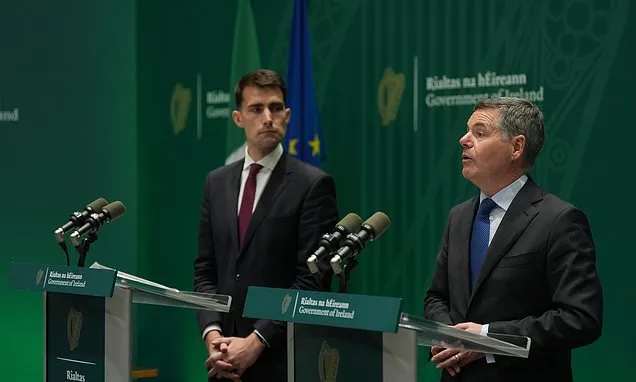The Irish Government is set to bring in 1.5 billion euro of tax cuts as part of next year's budget, according to the Summer Economic Statement.
The Budget Day package, set to be announced of October 7, will be 9.4 billion euro.
This will comprise spending of 7.9 billion euro and taxation measures amounting to 1.5 billion euro.
Overall spending across current capital will increase by 7.3% for next year.
However, the Minister for Finance Paschal Donohoe warned that the figures published on Tuesday are based on "a no-tariff scenario" imposed by the United States.
He published the figures alongside Minister for Public Expenditure Jack Chambers.
"Our Budget Day decisions could change depending on the economic environment we find ourselves in during the summer and beyond," he said.
He said all they can see is "change and risk" around the uncertainty of trade, investment and politics.
"Of course, none of this is positive for the economy of the world, and by extension, therefore, for Ireland," Mr Donohoe added.
"This is most evident in the debates and negotiations that are under way with regard to trade, which is why us, within the European Union and the (EU) Commission on our behalf, will be redoubling our efforts to negotiate a better deal with regard to trade between the EU between now and August 1.
"Because of all of this, it's very clear that we're at a moment of significant transition to the economy of the world, and even for the economy. But notwithstanding all of this, our economy continues to grow.
"In the first quarter of 2025, our economy grew by almost 3% after a year of strong growth in 2024, and where that strong performance is most evident is in the number of people at work in our country."
Mr Donohoe said it is "very likely" that negotiations between the EU and the US will reach a conclusion in the coming weeks.
However, he said the Government's intention is to be "flexible" in its approach to Budget Day.
"Our overwhelming priority is to maintain our public capital investment, in particular the figures that will be outlined by Minister Chambers," Mr Donohoe added.
"However, should economic or budget conditions change, we will amend other elements of budget policy to ensure we get the balance right.
"Minister Chambers and I, in consultation with the party leaders, will continue to assess that balance in the weeks ahead.
"I emphasise that point because Minister Chambers and I are very much aware that we are publishing this statement and committing to a National Development Plan at a moment of uncertainty.
"We know an antidote to some of that uncertainty is certainty regarding our investment plans, and that is what is being outlined here today. We can do so because our economy is resilient."
Mr Chambers said the Government is having to navigate "serious economic uncertainty".
"If there's a serious economic deterioration, we absolutely will have to revisit what we're setting out today to be responsible and agile in the context of changing our global position, and we agree on that," he added
"So this is very much caveated by what could happen in the coming weeks, and we won't make decisions that aren't sustainable or affordable for the Irish economy."
He added: "While capital expenditure will increase by two billion euro in line with the National Development Plan review, this will result in total available current expenditure of 97.5 billion euro; capital expenditure of 19.1 billion euro in 2026."
"The expenditure ceilings for 2026 will facilitate a budget that will provide for enhanced public service delivery and increased capital investment in critical infrastructure under the new and renewed National Development Plan."
"At the same time, given profound global economic uncertainty, it's crucial we moderate current spending and provide permanent and sustainable investment as well as focusing on addressing our infrastructure deficits."
